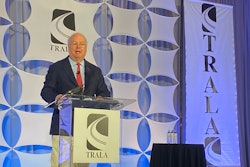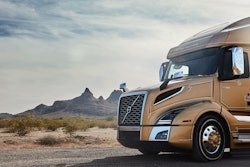
As March races to its conclusion, just days remain for medium- and heavy-duty truck manufacturers to use legacy model year (MY) 2023 engines in their production lines to build new trucks that will be sold in California as part of the state’s low NOx Omnibus rule.
Beginning April 1, only MY 2024 engines that have been approved by California’s Air Resources Board (CARB) as compliant with the state’s Omnibus regulation, or limited quantities of engines receiving compliance through credits earned by manufacturers, will be allowed to be used in production lines with intent to be sold into California later this year.
As of March 28, California’s Air Resources Board (CARB) has certified more than 40 engines from seven manufacturers across the medium- and heavy-duty trucking space as compliant with rule making. Cummins leads the market with 14 certified engines (though five earlier engine submissions have recently been superseded by newer submissions by the engine maker), followed by seven from General Motors, six from Ford, four apiece from Detroit Diesel and Paccar and three from Roush and Volvo Group. Fuel types vary from diesel, gasoline and natural gas across the manufacturers.
[RELATED: CARB working to align with EPA 2027 regulations]
Yet beyond this information found in CARB’s public record, little is known about the production schedule for these engines, and when they’ll finally reach California’s fleet community. Additionally, because trucking’s engine makers achieved CARB compliance different ways, requirements to sell MY 2024 compliant engines varies across engine models and truck brands.
With the return of 50-state engines solutions likely still years away, Trucks, Parts, Service recently reached out to Class 8 truck and engine manufacturers for clarification about their engine plans in California, to little success.
Cummins’ CARB-approved engines are equally spread across the medium- and heavy-duty sector. The company has earned certifications for three natural gas engines, mostly to be used in medium-duty and bus applications, per their submission documentation to CARB. Cummins’ certified diesel options range in size from 6.7 liters up to 15 liters. Cummins did not respond to questions regarding engine availability.
At Paccar, diesel configurations of its MX 11 and MX 13 engines have been certified by the state, yet Kenworth and Peterbilt were unable to answer any questions regarding rollout and availability.
Detroit Diesel has four engines on CARB’s compliance website, yet for 2024, Daimler Trucks North America states “our Class 8 customers in California have the choice of our own Detroit DD13, DD16 and electric powertrains, along with the Cummins X15.”
Volvo went on record to state it has three diesel engines for the Class 8 California market, the D11 and D13 VGT (variable geometry turbo) and the D13 TC (turbo compounded/fixed geometry turbo).
Volvo Director of Product Marketing Johan Agebrand also stated “fleets in California will be able to buy an electric vehicle, a diesel vehicle that meets the Omnibus NOx standard, and a limited number of ‘legacy diesel vehicles’ that do not meet the 2024 Omnibus low NOx standard, but are allowed under the regulation. With the exception of the electric vehicles, fleet purchases of any diesel vehicle in California are subject to restrictions based on CARB’s regulations which mandate a certain percentage of trucks sold are ZEVs.”
[RELATED: California dealers get reprieve, approval to sell non-Omnibus engines out of state]
Volvo Group’s aforementioned CARB-certified engines include Mack configurations, but Mack Trucks did not respond to questions regarding rollout and availability.
International also did not respond to questions regarding engine availability.
Thanks to January change in the Omnibus rule, California truck dealers can still sell 49-state engines to customers domiciled and operating outside California. But for customers solely located within the Golden State, the availability of the CARB-approved engines referenced above will ultimately determine how many trucks they can add into their operations from now through 2026.










